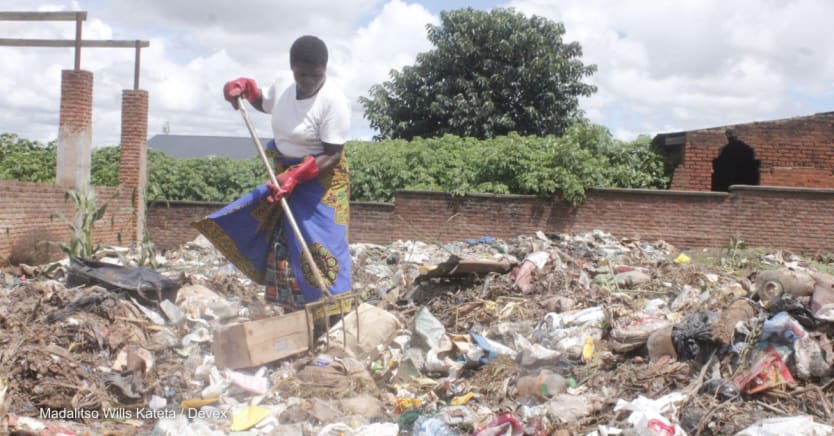
After using chemical fertilizers for over 20 years, Sabawo Chikuni started using organic fertilizers on his five-acre farm two years ago — due to the rising cost of chemical fertilizers.
Get the inside track on how agriculture, nutrition, sustainability, and more are intersecting to remake the global food system in this weekly newsletter.
Since he started using the organic fertilizers, Chikuni said he is happy with their impact on his crops. Coming from readily available and renewable sources, organic fertilizers have cut his cultivation costs by 80%.
“These fertilizers are as effective as most of the chemical fertilizers,” said the 50-year-old farmer from Neno district in southern Malawi. “The most promising part … is that they maintain the soil structure as opposed to chemical fertilizers.”
The Food and Agriculture Organization recently warned that the Russian invasion of Ukraine will have serious consequences on global food supply as Russia is the world’s top exporter of nitrogen fertilizers and the second leading supplier of both potassic and phosphorous fertilizers.
Agriculture experts in Malawi have warned that the rising fertilizer prices — which they believe could triple in price because of the war in Ukraine — will have severe consequences on different development sectors of low-income countries such as Malawi. Adding that countries should now start to look for alternatives to chemical fertilizers.
Agriculture policy expert Tamani Nkhono-Mvula told Devex that global indicators show that farmers in Malawi who are currently paying around 27,000 Malawian kwacha ($33.35) per 50-kilogram (110-pound) bag of fertilizer should be expected to pay around 70,000 Malawian kwacha for the same bag by the end of the year.
“Russia is one of the major global producers of fertilizers and its invasion of Ukraine will definitely affect the country’s agricultural sector, and as a country, we need to look at alternatives such as the use of biofertilizers and compost manure,” Nkhono-Mvula said.
While farmers in low-income countries face many challenges to cultivate crops, one of the biggest causes of crop failure in these countries is low nutrients in the soil. In Malawi for instance, maize — the country’s staple crop — demands lots of nutrients, and growing the plant without fertilizers is difficult. Chikuni said farmers can have better agricultural returns if they adopt organic fertilizers, which are very cheap and easily available and can boost soil fertility.
At his farm, Chikuni feeds agricultural waste into a small biodigester that costs around 726,000 Malawian kwacha, which a farmer can pay in 12 installments of under $60 per month after paying a deposit. The biodigester has an inlet that feeds human excreta and other domestic waste from his home sewerage into the system. Made from plastic sheets, the digester which is submerged in water creates an anaerobic environment that allows bacteria to break down the biomass into methane, which is pushed through a piping system to a gas stove in his kitchen.
The biogas digester also produces a slurry byproduct — that is used as an organic fertilizer — which is collected for his farm. A rich source of phosphorus, potassium, and nitrogen, the sludge which is applied as basal dressing is supplemented by bionitrate fertilizer, which he produces by maturing urine in plastic containers.
“Producing these fertilizers is very cheap and cost-effective as it only involves the use of readily available recyclable resources,” Chikuni said.
Goodfellow Phiri, director at Environmental Industries, a nonprofit that has been working with different local and international organizations in Malawi to promote the use of biotechnology-producing organic fertilizers, which are economically sustainable and environmentally friendly, said bionitrate fertilizers are safe to use and do not pose any health hazards.
“We are training farmers on how they can get maximum yields from organic fertilizers like bionitrate and the sludge from biogas digesters, but we are currently facing low adoption because of mindset change towards fertilizers made from biomass,” said Phiri.
He said while the demand for bionitrate fertilizer, which is manufactured from human urine, was steadily rising among subsistence farmers in some parts of the country, health and ethical questions raised by some farmers on the safety of the fertilizers had derailed quick adoption of the technology. But due to the rising costs of chemical fertilizers many farmers are now turning to biofertilizers. Following the war in Ukraine, Phiri said his organization is promoting the fertilizers as a cost-effective choice and he is optimistic that demand will rise this year.
He added that while the government of Malawi spends over $215 million to subsidize chemical fertilizers under the Affordable Inputs Program they should instead consider replacing the chemical fertilizer subsidy with a program promoting organic fertilizers.
A study by the International Food Policy Research Institute found that while subsidizing fertilizer prices increases use, yields, and household income, it discourages use of organic-based materials and methods to maintain soil fertility.
Mphanda Kabwanzi, national program coordinator at Global Environmental Facility, said countries such as Malawi needed to look for better alternatives to chemical fertilizers such as compost manures and bionitrate fertilizers.
“The good thing with the biofertilizers is that they are environmentally friendly and they can also help to boost soil fertility as well [as] structure,” she said.
Stephen Chiunjira, executive director of Our World International, a local nonprofit that promotes sustainable waste management and sustainable agricultural practices, said bionitrate fertilizers are the future of agricultural growth in low-income countries such as Malawi.
“As prices of farm inputs like fertilizers continue to soar, farmers need to embrace sustainable technologies like the use of biodigesters which apart from providing the farmer with clean energy are also a source of cheap and affordable fertilizers,” Chiunjira said.









